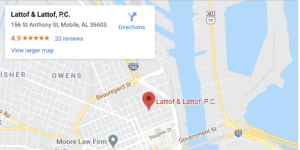How Alabama Statutes Affect Personal Injury Claims

If you are considering filing a personal injury lawsuit in Alabama, laws in the state may limit how long you have to sue, who you can and cannot sue, what happens if you are partially at fault, and more. As an injury victim, it’s important to understand how Alabama statutes will affect your personal injury claim.
The Mobile personal injury lawyers at Lattof & Lattof, P.C. will help you explore your legal options with an in-depth understanding of Alabama statutes. We have more than 100 years of combined experience representing accident victims and navigating complex legal issues.
The following is an overview of the statutes that may affect your claim. Please call our law office to schedule a free consultation if you have additional questions.
Table of Contents
What Is a Statute?
A statute is simply a written law passed by a legislative body in the state. There are many sections of statutes in Alabama covering different areas of law such as:
- Agriculture Code
- Civil Practice
- Criminal Code
- Education Code
- Insurance Code
- Marital and Domestic Relations Code
- Property Code
- Revenue and Taxation Code
In most cases, personal injury cases involve Alabama Code Title 6, Civil Practice. This section contains statutes defining the process of civil lawsuits, available remedies, damages, and more.
Statute of Limitations in Alabama
When you are injured in a car accident, slip and fall accident, workplace injury, or some other type of accident, you have a limited amount of time to file an injury lawsuit.
This time period is called the statute of limitations.
In Alabama, the statute that applies to civil claims is covered under Alabama Code Title 6. Civil Practice Section 6-2-38 which generally gives you just two years from the date of your injury to file a personal injury lawsuit. If you miss this legal deadline, you lose your legal right to seek compensation.
However, this two-year statute of limitations does not apply to all types of personal injury claims. There are many scenarios that can pause the statute of limitations and extend the amount of time you have to file.
Claims that involve child injuries are the best example. If the injured person, at the time, is under 19 or declared “insane,” they are considered to have a “legal disability.” Under Code of Alabama Section 6-2-8, the statute of limitations will be suspended until they are declared sane or turn 19 at which point they have two years to file a claim. However, the deadline can’t be extended past 20 years.
The statute of limitations can also be paused if the defendant, or the person allegedly responsible for the victim’s injuries, is absent from the state of Alabama at any point after the accident. The time they were absent usually doesn’t count against the two-year time limit.
There is a unique statute of limitations that applies to claims against an employee of a municipal or local government. Formal injury claims against a municipality have a 6-month statute of limitations according to Alabama Code Section 11-47-23.
When Does a Statute of Limitations Apply?
The statute of limitations in Alabama applies to all types of civil claims. This includes civil claims from accidents covered by personal injury law such as:
- Motor vehicle accidents including car accidents, pedestrian accidents, bicycle accidents, truck accidents, and motorcycle accidents
- Dog bites
- Defective products and dangerous drugs
- Medical malpractice
- Nursing home abuse
- Workplace accidents such as construction accidents
- Premises liability cases such as a slip and fall accident
- Wrongful death cases
In any of these types of cases, Alabama law requires that you prove the other party was liable for your injuries through negligence, recklessness, or wanton behavior.
Who Cannot Be Sued in Alabama?
As a general rule, when someone else’s negligence causes your injuries or the death of a loved one, you have the right to sue them. There are a handful of exceptions in Alabama, however.
Alabama’s Good Samaritan Act
Section 6-5-332 gives non-trained and trained responders immunity to lawsuits during an emergency. You cannot sue a good Samaritan who acted in good faith to render aid to a victim during an emergency for injury or death of the victim.
Government Entities
Lawsuits involving government entities in Alabama are among the most complex. Under Article I, Section 14 of the Alabama Constitution, “the State of Alabama shall never be made a defendant in any court of law.” This is referred to as sovereign immunity. While many states have statutes that waive immunity in some cases, Alabama does not.
You may file a claim against government agents or employees in Alabama in civil court if they were acting contrary to the scope and course of their employment.
Claims against county or city employees have different rules and statutes of limitations.
Minors
Accidents caused by children also have unique rules. Alabama law applies different standards to minors depending on their age group when deciding if a minor can be held liable for causing someone’s injuries. Very young children can’t be held liable, but their parents may be liable for negligence.
At a certain age, children can be held liable for intentional injuries they cause. Older children, such as teenagers, may be held legally liable for negligence. This is true for teenagers who are driving, for example, and held to the same standards as adult drivers.
Alabama’s Contributory Negligence Rule
One of the most important laws in Alabama that may affect your personal injury case is the contributory negligence rule. In Alabama, you can be barred from recovering any compensation at all if you are found even partially at fault for your accident or injuries.
Most states use a comparative negligence rule instead, that allows you to recover compensation even if you are partially at-fault with your damages reduced by your share of fault.
This harsh contributory negligence rule makes it even more crucial to work with an experienced personal injury lawyer in Alabama. If the other party or their insurance company are successful in shifting even a tiny amount of blame onto you, they can escape paying for any of the damages you have suffered.
The only exception Is contributory negligence cannot be used as a defense to acts of willfulness or wantonness.
Contact a Mobile Personal Injury Lawyer for a Free Consultation
If you have been injured in an accident caused by someone else, Alabama law gives you the right to seek compensation for the damages you have suffered. With the Alabama personal injury lawyers at Lattof & Lattof, P.C., you do not need to navigate complex statutes and case law yourself. We are here to help you aggressively seek the compensation you deserve and fight for your rights.
Contact our law firm today to schedule a free case review with an experienced personal injury lawyer in Alabama to discuss your legal options.

